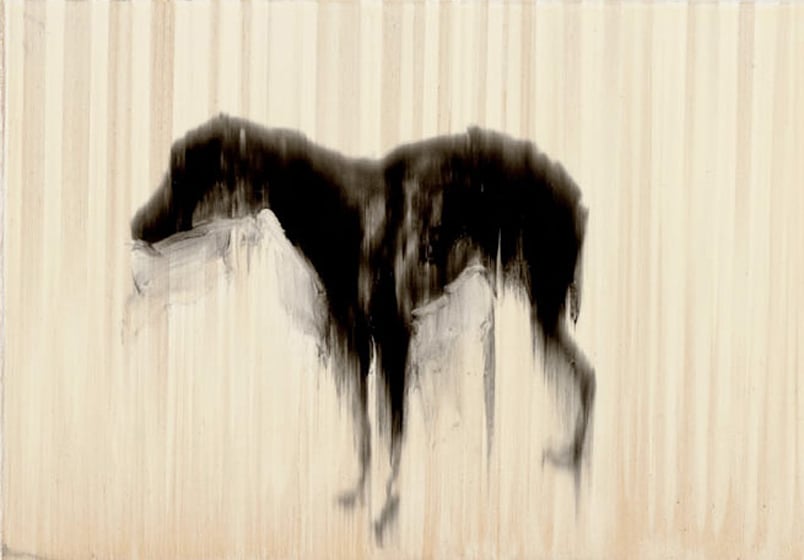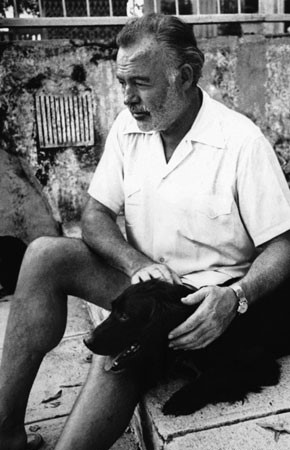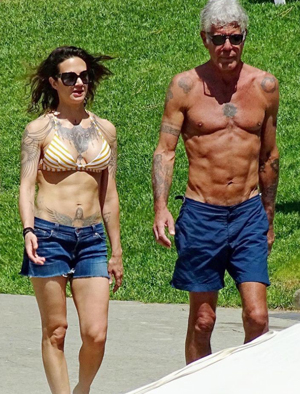by G. Murphy Donovan (August 2018)

Black Dog, Rachel Howard, 2007
Grave men, near death, who see with blinding sight
Blind eyes could blaze like meteors and be gay,
Rage, rage against the dying of the light.
—Dylan Thomas
We now “go gentle into that good night” in spite of Dylan Thomas’ frantic advice. Depression is epidemic. Suicide is celebrated. We do not rage against the “dying of the light” anymore, we just turn off the lights – with drugs, a rope, or a shotgun. Suicides don’t necessarily have to bleed to lead, but it helps.
Churchill captured the best metaphor for the best excuse. He called depression the “black dog,” an insult to cheerful and congenial Labrador’s everywhere. Churchill was tough enough, in spite of “social anxiety,” to spend his twilight years as a functional drunk, a serious tippler who may have saved Europe from itself.
 Today, nothing gets better ink than a celebrity suicide, underwritten by snap diagnosis like depression. Ernest Hemingway may have set the modern standard with a Nobel Prize and a pricey WC Scott double-barrel.
Today, nothing gets better ink than a celebrity suicide, underwritten by snap diagnosis like depression. Ernest Hemingway may have set the modern standard with a Nobel Prize and a pricey WC Scott double-barrel.
Apparently success in nirvana, New York, or Ketchum is now a fatal burden. Hat tip to Kurt Cobain.
Lest you believe fake news began with the Trump era, the New York Times reported the Hemingway suicide as a gun cleaning “accident.” Yes, you were led to believe that a world-class big game hunter blew his brains out in 1961 whilst “cleaning” a loaded two banger. Thus you might also believe that Lenny Bruce, Marilyn Monroe, Jim Morrison, Michael Jackson, Elvis Presley, and Prince subsequently passed away while “cleaning” their medicine cabinets.
A few weeks ago, Manhattan lost two celebrities to hara-kiri by hanging, Kate Spade and Anthony Bourdain. She offed herself with a scarf. He used a belt. Yes, yes, they were New Yorkers; fabulously famous, successful, rich – and, of course, depressed. People magazine featured the iconic Manhattan pair in memoriam, side-by-side, on the cover.
Celebrity grief is now accompanied by a kind of public onanism, just as surely as an entree follows an appetizer.
Medical laments about Anthony Bourdain are illustrative. He was a niche celebrity, a foodie thug, a tattooed urban navel gazer whose rhetoric and politics were warped by Manhattan myopia and a single-syllable, four letter vocabulary. He was a fixture on CNN, a network where vulgar and partisan have been on the menu since Jane Fonda shagged the boss.
 Bourdain was a #Metoo misogynist too. Seems Tony’s girlfriend was molested by Harvey Weinstein, an allegation that apparently gave Bourdain a get-out-of-jail-free card with Knickerbocker liberals and Hollywood. By his own admission, Chef Tony often pounded women, employees, and female colleagues, in life, or print, like veal cutlets. Irony in Manhattan, apparently, is still a bitch.
Bourdain was a #Metoo misogynist too. Seems Tony’s girlfriend was molested by Harvey Weinstein, an allegation that apparently gave Bourdain a get-out-of-jail-free card with Knickerbocker liberals and Hollywood. By his own admission, Chef Tony often pounded women, employees, and female colleagues, in life, or print, like veal cutlets. Irony in Manhattan, apparently, is still a bitch.
If there were an honest doctor in Paris, the coroner might have concluded that Anthony Bourdain choked on ego.
Bourdain was probably a better writer than cook in any case. To be fair, the hangar steak and French fries at Les Halles were excellent.
So we are left to ask ourselves; how does a rich niche celebrity with bestsellers, a couple of TV shows, a travel gig, and a tattooed girlfriend get so bummed and depressed that he facilitates “the dying of the light?”
Answers may be found in the psychobabble swamp, that fake science regime, where all manner of bad behavior gets excused or rationalized. Modern psychology may be to science what reality television is to reality. Candor about quacks and their patients is seldom welcomed at the table of common sense. But let’s try.
Begin with the four legs of modern social pathology; alcoholism, drug addiction, depression—and suicide. We are told that junkies and drunks are ill as if alcohol and dope are caught from the sneeze guard, a handshake, or a toilet seat. Hard to know which is a cause and which is an effect when depression and suicide are thrown into the mix.
One thing is clear, however. Alcohol, drugs, and suicide are choices long before they are illness, long before they are terminal. Junkies, drunks, and suicides all make a host of bad decisions over time, serial choices that should be depressing, especially for family and friends. Bad judgement and poor choices are the root of all addictions. And just as surely, good choices are required for any remedy. Character is relevant to the problem and the solution. Right and wrong matters. Boundaries matter.
A moral compass, of some sort, matters. Science and medicine are mostly mute on the moral ingredients for good health and long life.
Attempted suicide, like too many tattoos, is a cry for help. Successful suicide is a mercy killing, a fatal self-indulgent option selected by cowards and loose cannons.
Yes, cowards. Life is hard, death is easy. Eating your gun is a piece of cake, compared to the travails of living. If young nitwits only killed themselves out of shame, then suicide might be a public service.
Here a distinction between real pain or physical trauma and some whiner who suffers from “social anxiety” is appropriate. Aged incurables, with real ailments, that choose to die with a little dignity are one thing. The lame burn-out who turns the lights off early is just another nitwit. Premature suicides are not patients, victims, or heroes.
Indeed, alcoholics at heart are universally selfish. They don’t care how or who their behavior hurts. Junkies are invariably stupid, especially if behavior is a metric. Abundant drugs make junkies numb and clueless. Drug deficits make junkies physically ill, reinforcing the cycle of rehab, false regrets, and recidivism.
Choice and character matter.
The only real difference between a drunk, a junkie, and a suicide is that the suicide ultimately makes a humane choice for the rest of us. Bourdain was a triple threat, not without self-loathing for sure, but he still relished his outlaw persona, that loose cannon charade. Bourdain’s act was a lot like rap, he found a way to monetize bad ass.
Alas, we lament celebrity suicides as if no one will ever sell another over-priced handbag, write another book, or French another potato. Before the psychobabble era, a suicide might be thought of as Darwin’s proof, natural selection or survival of the fittest writ large—or for mystics, maybe poetic justice, the hand of a righteous God.
Today, celebrity suicides are put up as heroes, victims, and role models—or all three.
The best that you can say about celebrated snuffs is that they will be imitated. Suicides, like serial killers and mass murderers thrive on attention, pity, and headlines—dead or alive.
Hollywood, television, video games, graphic novels, and comic books all target young nitwits with a daily diet of blood and guts fantasy. Violence to self and others is the way we roll in America.
Grotesque is now set to music in New York. A “suicide musical” just won a handful of awards on Broadway. The plot of Dear Evan Hansen shows us a lad with “social anxiety” as he tries to friend a suicide after the fact, a kid he never knew or cared for when alive. The necrophiliac lead wears a cast on a broken arm throughout, a symbol, no doubt, to remind New Yorkers that social anxiety, depression, and even suicide are like broken bones, no-fault burdens.
Evan Hansen is clearly underwritten by the “shit happens” school of psychobabble.
Suicide is now cool. It may be art, but it’s still not character. What to do? Not much probably. Folks who come to believe that they are victims, heroic, or “patients,” have little motive to change any behavior.
More pharma will do, thank you.
We could, however, shoot the black dog. Depression is more excuse than diagnosis. Everyone is anxious or depressed at one time or another. We have already identified and thrive on the antidotes to depression. Alcohol, drugs, suicide, show tunes, fantasy, and whining are universally available without prescription.
Real scientists now admit that most so-called overdose deaths are suicides. Yet, nobody is thinking about closing pharmacies or dive bars. And the celebrity suicide cult will still provide role models. Indeed, maudlin trolls have taken to defining those of us who don’t try suicide as “survivors.”
In a world of victims, no one lives anymore, they just survive.
If Anthony Bourdain hadn’t choked on ego, he might have gagged on Bravo Sierra anyway. In Kitchen Confidential, he fantasizes about how a good kitchen is like a military operation. Hard to imagine Bourdain in uniform, on Parris Island, or on a battlefield for any reason.
Nonetheless, Tony spilled a lot of ink on character, virtues like honesty and showing up on time. Lip service was often followed by yarns about kitchen sex, drugs, rock and roll, and suicide; none of which have anything to do with character, self-control, or restraint.
In his own words, here’s what Tony had to say about a fired, suicidal line cook:
That guy had to go . . . let him show up late, fuck up service because he’s going to off himself ? Fuck him. We’re on a lifeboat baby. The weak? The dangerous? The infirm? They go over the side.
Bourdain’s last meal in Paris might have been crow.
In the end, Bourdain threw himself over the side. Maybe it’s a French thing. In most of his writing about “character,” and associated TV trash talk, Bourdain never seemed to appreciate that character is a balanced blend of mental and moral qualities, a recipe that has remained unchanged since Plato was a pup.
Suicide at best is just another word for epic fail—premature and permanent surrender.
______________________
G. Murphy Donovan comes from a long line of Irish Catholic drunks in the Bronx. As a lad he worked in kitchens and restaurants. As an adult, he spent a quarter of a century with the deep state. He has eaten at Les Halles. Now, he just scratches his head.
Follow NER on Twitter @NERIconoclast







